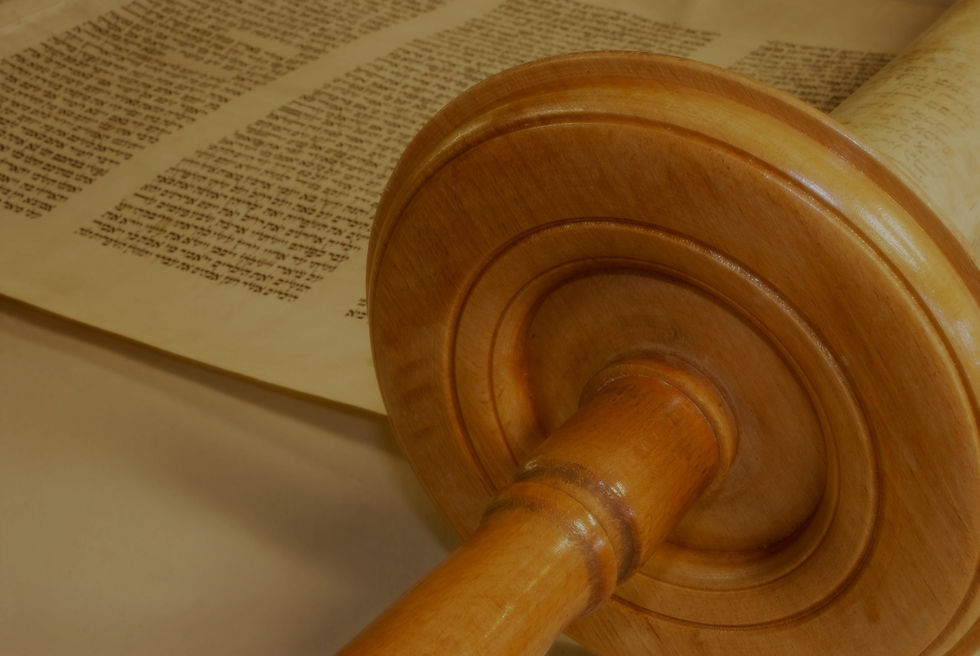Just Judgements
- Light of Torah

- Aug 1, 2025
- 3 min read

In Deuteronomy 1:6-18, Moses retells (and embellishes) a story already told in Exodus 18: how he appointed and instructed a number of judges to assist in the leadership of the people. From this passage, generations of Jewish commentators have derived detailed reflections on the regulations of judicial procedure which help to create a just society. Let’s explore a little of this text drawing on the interpretations of some of the sages.
“Now I commanded your judges at the time, saying: hear-out (what is) between your brothers, judge with equity between each-man and his brothers or a sojourner” (Deut. 1:16).
[Note: here we are using Everett Fox’s translation which seeks to echo the sound-structure of the Hebrew. Compare with the translation in your bible.]
The sages ask, what is the point of telling the judges that they must ‘hear’ the case at hand? Surely that is obvious...
The sages ask, what is the point of telling the judges that they must ‘hear’ the case at hand? Surely that is obvious... that’s what judges do! And why the repeated use of ‘between’? These ‘clues’ or ‘irritations’ in the text signal a place to dig deeply into the word of G-d. What insights can be found there?
The sages note the unusual form taken by the verb ‘hear’: shamo’a. Rashi [1] takes it as a verb of continuous action in the present, i.e., ‘be listening’, give the case your continual, undivided attention.
The author of Or Ha-hayyim [2], concurs, saying that the Torah is implying that:
“The judges must be patient and hear them out. If one of the litigants wishes to bring more evidence or arguments, the judges should not cut him short but they must ‘hear’ continuously” and without intermission or delay, even if the case is tedious. “The Torah thus prohibits the injustice of protracted legal proceedings and demands swift justice.”
And what of the repetition of ‘between’? In the Talmud we read:
“Said Rabbi Hanina: this constitutes an admonition to the court not to hear the words of one litigant before his opponent has arrived” (Sanhedrin, 7b).
The hearing of one party without the other present may undermine the impartiality required for good judgment, and the Torah specifically warns against this:
“You are not to (specially) recognise a face in judgment, as the small, so the great, you are to hear-them-out” (Deut. 1:17).
The Or Ha Hayyim interprets the word ‘between’ this way:
“The judge must not serenely look at one and avert his gaze from the other, but his hearing must be ‘between’, equally balanced.”
The Torah, then, can be seen to highlight the importance of intense listening and impartiality in judicial procedure.
“You are not to be-in-fear of any man, for judgment—it is God’s!”(Deut.1:17; cf. 2 Chronicles 19:6-7)
The administering of justice is a serious duty and privilege entrusted to human beings by the Almighty. It is not only for courtrooms. Settling disputes and upholding a just order are part of life in homes, parishes, schools... Drawing upon your life experience and with reference to the text, share your own insight into what it means to bring justice to bear in a situation. •
Notes:
1. Revered 11th century French Torah scholar.
2. Torah commentary by R. Hayyim Ibn Attar (1696-1743)
Bibliography: Fox, The Five Books of Moses (New York, 1995); Herczeg, ed., RASHI. Commentary on the Torah Vol.5 (New York: Mesorah, 2001); Leibowitz, Studies in Devarim (New York, 1996). Scripture: Everett Fox. Image: Shutterstock.
© Teresa Pirola, 2012. lightoftorah.net. Reproduction for non-commercial use permitted with acknowledgement of website.
Light of Torah is a Sydney-based grassroots ministry encouraging Christians to reflect on Torah with the help of Jewish insights. More... The reflection above refers to Parashat Devarim (Deuteronomy 1:1 - 3:22), the Torah portion read for this Sabbath in the Jewish liturgical calendar. Shabbat shalom!



Comments